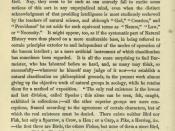"Truth Is That To Which A Community Settles Down"ÃÂ (Charles Pierce) The question of truth and falsehood has been wrapped in unnecessary mystery owing to a number of causes. In the first place, people wish to think that their beliefs are more apt to be true than false, so that they seek a theory that will show that truth is normal and falsehood more or less accidental. In the second place, people are very vague as to what they mean by "ÃÂbelief' or "ÃÂjudgement' though persuaded that they know beliefs or judgements to be the objects to which the predicates, "ÃÂtrue' or "ÃÂfalse' apply. In the third place, there is a tendency to use "ÃÂtrue' with a capital T in the grand sense, as something noble, splendid, and worthy of adoration. This gets people into a frame of mind in which they become unable to think objectively. But just as the gravediggers in Hamlet become familiar with skulls, logicians became familiar with truth.
"The hand of little employment hath the daintier sense,"ÃÂ says Hamlet. Therefore it is not from the logician that awe before truth is to be expected.
There are two questions in our present subject: 1) what are the objects to which the predicates "ÃÂtrue' and "ÃÂfalse' apply? 2) When do we accept a statement as "ÃÂtrue' or "ÃÂfalse'? We will look at the first question first.
"ÃÂTrue' and "ÃÂfalse' apply to statements, whether in speech or in writing. By extension, they are supposed to apply to the beliefs expressed in those statements, and also to hypotheses, which are entertained without being believed or disbelieved. But let us first consider the truth and falsehood of statements, following our practice of going as far as we can with the behaviorists before falling back on introspection. We consider the meaning...


